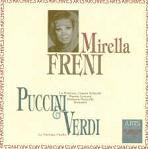Besides the Act 1 finale and “Teneste le promessa…Addio del passato” from Traviata, which is taken from a 1973 film led by Lamberto Gardelli (with the Staatskapelle Berlin), these selections were recorded in 1977. All of them prove the point that Mirella Freni probably was the finest Italian purely lyric soprano of the decade (and possibly the one that followed). She is partnered in duets from Manon Lescaut, Gianni Schicchi (an awkward one minute and 22 seconds), La bohème, Madama Butterfly, and Otello by leather-lunged, not-subtle-but-exciting-and-reliable-and-vibrant tenor Franco Bonisolli–and, all other things being equal, it’s a pleasure to hear two singers go up to a high-C at the close of the first act of Bohème with absolute security and no sense that either is screaming. In fact, the utter security and perfection of intonation of both of these singers makes this CD a pleasure to listen to. But that aside, Freni’s loveliness as Mimi and Lauretta, her introspection in Manon’s “In quelle trine morbide” and Violetta’s “E strano…”, her femininity as Desdemona, and her vulnerability as Butterfly (and Liu, for that matter), are a joy. This is a great soprano at her greatest. The accompaniments are worthy, and while not state-of-the-art, the sound is certainly good enough. Highly recommended. [7/11/2003]
































